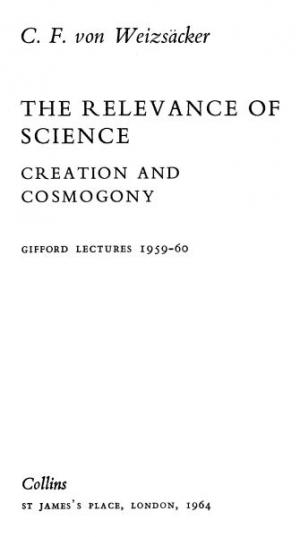Weizsäcker presents an account of the history from which our scientific civilization arose. This is introduced by ‘Science and the Modern World’, a lecture showing the influence of science on the modern world. He expounds this analysis not by consideration of sociology, economics or politics, but by examining the truth of science, focusing on its meanings, its limitations and its possible ambiguities.
As outlined in the introduction, the lecture series discusses the two roots of the traditional Christian views about creation: the Platonic one based on the ‘Timaeus’ and the biblical view of the Old Testament. He treats the original meaning of the Platonic and biblical views, their merging in Christianity and their modern transformation. He starts with an account of true mythology, examining what cosmogonical myths really are and dealing with the relationship between myth and science.
Lectures 3, 4 and 5 expound the views on the origin of the world presented in the Old Testament, in Greek philosophy and in Christian theology. Lecture 3, ‘Creation in the Old Testament’, examines Genesis I. Lecture 4, ‘Greek Philosophy and Cosmogony’, is followed by ‘Christianity and History’, which discusses Christianity’s self-understanding as a community representing a supernatural power. Weizsäcker points out that orderly government was promoted by bishops. He describes modern political history as the history of the increasing power of the state.
Leaving political history, he turns in lecture 6, ‘Copernicus, Kepler, Galileo’, to the origin of the problem raised by modern science from the sixteenth to the eighteenth centuries, demonstrating the way in which the Christian concept of creation matched scientific views in the early modern age. Lecture 7, ‘Descartes, Newton, Leibniz, Kant’, is followed by two lectures describing the cosmogony accepted by the science of our century.
Lecture 8, ‘The Evolution of Life’, discusses the question: Has there been an evolution at all? Furthermore, a possible causal explanation of evolution and the question whether plants and animals form a separate realm of nature are examined.
Lecture 9, ‘Modern Astronomy’, describes the actual status of the cosmogonical problem, presenting factual aspects and finally posing some philosophical questions.
In his final lecture ‘What is Secularization?’, Weizsäcker returns to the topic of the first lecture: science and the modern world. Thereby he considers what has been learned throughout the examination of history in the previous lectures. He especially considers the question of the secularization of the Christian faith. The concept of secularization is discussed, the theme of political revolution is further developed and a brief analysis of the three basic revolutionary concepts (freedom, equality, brotherhood) is given. In addition, Weizsäcker expounds the Christian background to the modern ambivalence and argues that on some very important matters Marx was nearer to Christianity than the committed Christians against whom he turned.
Benedikt Bock
University of Glasgow



